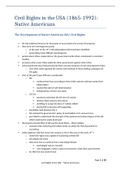Summary
Summary Civil Rights in the USA : Native Americans Full Revision Notes
- Course
- Institution
- Book
Civil Rights in the USA : African Americans, Native Americans, Women and Trade Union Revision Notes. Revision Notes broken up into themes and sub-themes for ease. 20 pages of extensive notes. For example: Topic: The Position of African Americans in 1865 (The Reconstruction Period) Wha...
[Show more]













